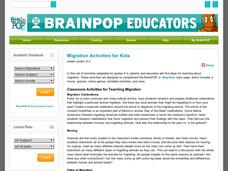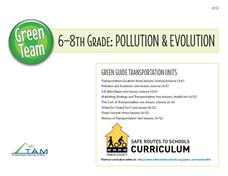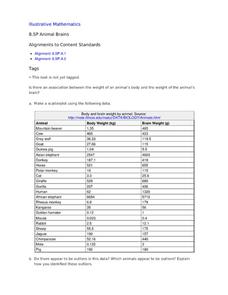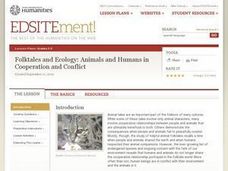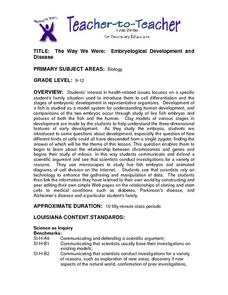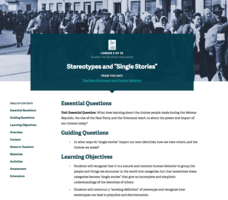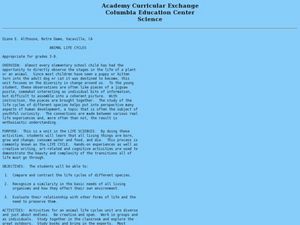Curated OER
Helpful Animals and Compassionate Humans in Folklore
Students define elements of stories from around the world that include helpful animals. They explore animal character motivations and use graphic organizers to compare and contrast animal stories from different cultures.
BrainPOP
Migration Activities for Kids
For as long as there has been life on earth, animals, including humans, have used migration as a means of survival. This collection of activities supports young scientists as they learn about this behavioral adaptation, encouraging them...
Safe Routes to School
Pollution & Evolution
Bring together a study of two major scientific topics with a lesson on the relationship between pollution and evolution. With the help of a PowerPoint presentation, hands-on activity. and class demonstration young scientists learn how...
Curated OER
Cloud in the Classroom
Students describe the relationship between animals and humans. In this biology lesson, students research about the history of horses in America. They present a mock news broadcast about their research.
Curated OER
Animal Brains
Do big bodies make big brains? Let your learners decide whether there is an association between body weight and brain weight by putting the data from different animals into a scatterplot. They can remove any outliers and then make a line...
Curated OER
Dinosaur Tracks: From Stride To Leg Length To Speed
High schoolers determine the relationship between leg length, stride length, and speed in humans and bipedal dinosaurs. They collect data and graph these human characteristics then use actual data collected from dinosaur track pads and...
Curated OER
Animal Life Cycles
Students participate in numerous activities to gather information about parts of the life cycle. In this life science lesson, the teacher choose from a number of activities to create or support an interdisciplinary unit about the life...
Curated OER
Regulating the Internal Environment
This presentation begins with the many problems multicellular organisms which rely on diffusion encounter. There are many diagrams of mammalian organ structures, and they are labelled with their relevant functions. This an excellent...
NOAA
Individual Species in the Deep Sea
A tube worm's outer covering is made of chitin, the same material that makes up the shells of lobsters and crabs. Scholars create tube worms and analyze and discuss the longevity of organisms living near cold seeps. They then discuss and...
LABScI
Population Dynamics: The Predator-Prey Lab
Wolves eat better when the bunny population increases, but how long does that last? A series of 12 biology lessons uses the sixth installment to explore the predator-prey relationship between bunny and wolf populations. Young scientists...
Curated OER
Folktales and Ecology: Animals and Humans in Cooperation and Conflict
Story elements such as conflict, character analysis, resolution, and moral are discussed and charted as elementary children read folktales involving animals. An element of science is also introduced as learners discover what a keystone...
Curated OER
Introducing Working Animals
Students identify ways humans and animals work together. In this animal welfare lesson, students read the text Hanni and Beth: Safe and Sound and define the term "working animals." Students investigate working animals by visiting various...
Curated OER
Interacting With Animals
Students identify the proper way to interact with animals. In this animal welfare lesson, students view pre-made picture cards of illustrations of people interacting with animals. Students categorize the cards into an "acceptable" and...
Curated OER
Human Impact on the Environment and Pollution
Learners illustrate the impact humans have on the environment through analogies and models. They observe demonstrations of human impact and pollution and create a composite picture of how people can have an impact on their environment.
Curated OER
Just "Kid"ding Around: The Truth About Goats
Students examine goats, and read a book based on their history. For this animal lesson, students discover the history of the goat, and complete several activities based on the students' knowledge of the animal.
Curated OER
The Way We Were: Embryological Development and Disease
Students use microscopes to study live fish embryos and animated diagrams of cell division on the Internet. They see that scientists rely on technology to enhance the gathering and manipulation of data. They create web pages on cloning.
Curated OER
Wright Again: 100 Years of Flight
Aspiring aeronautical engineers demonstrate different forces as they construct and test paper airplanes. This lesson plan links you to a website that models the most effective paper airplane design, an animation describing the forces...
National Wildlife Federation
I Speak for the Polar Bears!
Climate change and weather extremes impact every species, but this lesson focuses on how these changes effect polar bears. After learning about the animal, scholars create maps of snow-ice coverage and examine the yearly variability and...
Curated OER
Wonderfully Wild Unit
Students explore the ethics of 'fair' in regards to humans relationship with wildlife. In this wildlife study lesson, students read the story starters about wildlife and then discuss how to finish the story. Students finish the stories...
Curated OER
How Can Clear of Tress Destroy a Community?
Fifth graders brainstorm the relationship between trees and humans to determine how humans benefit from trees and how they benefit from us. They discuss oxygen/carbon dioxide exchange, soil stablization, animal habitat, shade, medicine...
National Gallery of Canada
Morphosis
Experience anthropomorphism and metamorphosis in action with flipbooks! Instead of giving human characteristics to animals, though, pupils will show a transformation from human to animal or vise versa through their drawings. The...
Facing History and Ourselves
Stereotypes and “Single Stories”
Help bring subconscious stereotypes to the surface to stop it in its tracks. Pupils first read an excerpt describing the experience of prejudice and analyze how this process connects to World War II. Then, they write a creative story...
Curated OER
My Owl Babies Miss Momma
Students investigate the relationship between children and parents by reading a book about owls. For this story analysis lesson, students read the book Owl Babies and participate in a role play based on one of the characters. Students...
Curated OER
Animal Life Cycle
Students conduct hands-on experiments. In this life cycle instructional activity, students are able to observe a variety of animals as they travel through their life cycle (brine shrimp, mealworms, frog eggs and chicken eggs). Students...



